Breaking down the cultural barriers
Breaking down the cultural barriers, but how much of the ‘social food environment’ can we control?
We have known for some time now that inadequate dietary behaviour is one of the leading causes of type 2 diabetes (T2DM). Due to genetics and lifestyle factors, South Asians are considered most vulnerable to developing T2DM compared to the general population.
I have seen first-hand within my own family; how prevalent this condition is, yet there is a reluctance to change lifestyles.
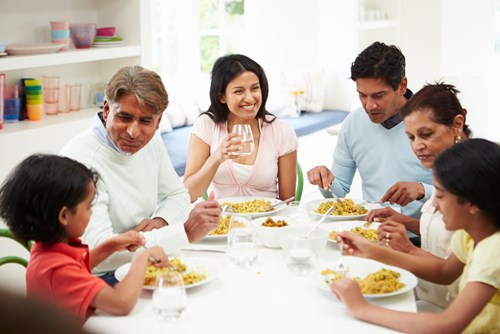
So why do South Asians struggle to make dietary changes?
It is common knowledge the frequency of consuming high calorie-dense food at social gatherings is prominent in South Asian culture. However, I have found that the deep-rooted socio-cultural framework is not always fully captured in intervention strategies for the BAME population. As a South Asian researcher, it fascinates me how little we are aware of our own cultural and behavioural patterns.
Culture is a complex and dominating factor embedded in our South Asian community. It influences how we behave towards lifestyle changes while also providing a sense of belonging.
Here is my take on this from a South Asian perspective. Some of the things I list below may sound a little familiar, but I felt this is an excellent way to explain how individual, social, and environmental factors influence our thoughts and actions.
For this blog, I will briefly apply the Theory of Planned Behaviour (TPB) (Azjen, 1991), commonly used to understand dietary behaviour within health psychology. This theory concentrates on three primary constructs that can predict an individual’s intention to carry out the desired behaviour.
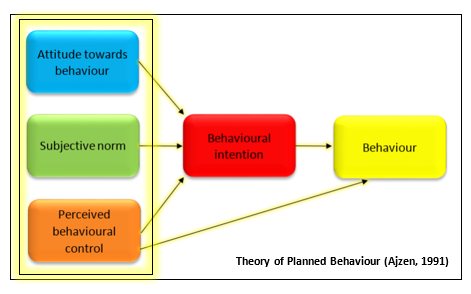
Attitude (personal influence)
Individuals will possess their own feelings and assess the value of performing a specific behaviour based on their intention.
- Do you feel joy when you are surrounded by your loved ones? Eating together with the family evokes positive emotions of togetherness that may appear like the right action.
- Do you sometimes feel guilty when you choose not to attend the gathering? The fear of feeling isolated or alienated from the family may govern the individual if they do not engage.
- Who can resist eating more than one mithai when you are celebrating a special occasion? Certain types of food, such as traditional sweets, may hold a specific meaning or ritual for the individual who may feel compelled to act on this. It may also be an opportunity for the individual to feel closer to their heritage by consuming traditional food and preserving their cultural identity.
One can argue; that there is a collectivist theme heavily present in this group where the individual puts the needs of fulfilling a ritual before their own beliefs or attitudes.
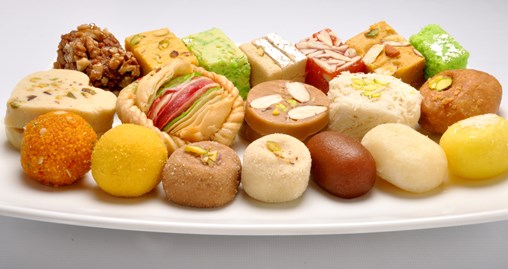
Subjective norm (social influence)
Social and peer pressure is heavily present in this community as research has shown that others influence food choices and level of food consumption. The shared beliefs and norms are often reinforced in social settings to influence and solidify group behaviour outcome.
- Why do our grandparents always insist on us eating literally everything in front of us? Now, this can be a universal thing but, in our culture, the individual may feel inclined to eat out of respect for the person who prepared the food. Especially if an older member of the family has prepared it. Refusing the food may be considered rude and act against the social norm of respecting elders.
There may also be conflict over traditional food, as younger South Asian family members may be heavily influenced by the western diet and open to modifying how they eat. However, first-generation migrants are most likely to be resistant to changing or modifying their diet.
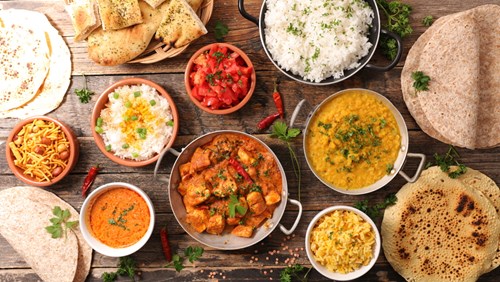
Perceived behavioural control (environmental influences)
Annual events such as weddings, Ramadan and festive events are featured prominently on a South Asian calendar as part of their cultural norm.
- Can anyone resist all the delicious food served during festive events? These are happy occasions where people should be allowed to enjoy and celebrate togetherness without the pressure of watching what they eat. However, the frequency of these events occurring can be a barrier to maintaining long term healthy dietary changes.
Such events hold ceremonial attachments to dietary practices and are a catalyst for performing rituals and retaining their cultural identity.
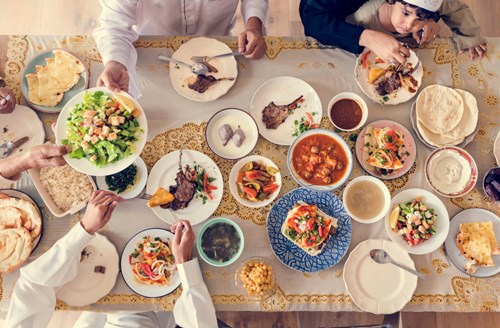
What does this mean for practice?
Social cognitive theories like TPB can prove useful in predicting dietary behaviour found in South Asians. Essentially, these life events taking place in the South Asian individuals’ life are impossible to always control. If the advice from practitioners lacks cultural acceptability, this may reduce adherence to dietary changes.
One example of this is creating guidelines around ‘eating well in Ramadan’, to demonstrate an awareness and provide support for important annual events like these. Preserving the core cultural practices and creating a framework that accounts for the socio-cultural belief system may determine the feasibility and level of success of a dietary intervention for South Asians.
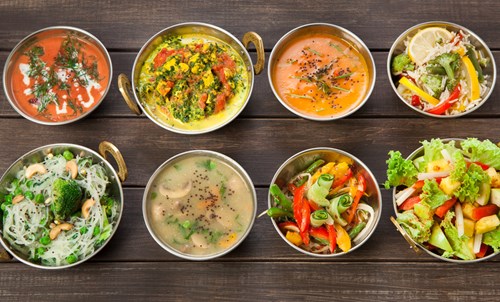
Takeaway thoughts
Understandably, changing the frequency of these social gatherings may prove problematic, however, focusing on the food content and choices is a likely solution. Raising awareness around healthier cooking methods such as grilling or oven baking for larger social gatherings allows the preservation of traditional food.
Further tips specifically for South Asians can be found here. This approach ensures cultural traditions are not dismissed when designing strategies for policy and practice.
To end this on a positive note, watch this inspirational video of Zuhoor who made positive lifestyle changes to manage his diabetes:
References
Khunti, K., Kumar, S. and Brodie, J., 2009. Diabetes UK and South Asian Health Foundation recommendations on diabetes research priorities for British South Asians. London: Diabetes UK.
Sohal, T., Sohal, P., King-Shier, K. M., & Khan, N. A. (2015). Barriers and facilitators for type-2 diabetes management in South Asians: a systematic review. PloS one, 10(9), e0136202.
McDermott, M. S., Oliver, M., Simnadis, T., Beck, E. J., Coltman, T., Iverson, D., ... & Sharma, R. (2015). The Theory of Planned Behaviour and dietary patterns: A systematic review and meta-analysis. Preventive Medicine, 81, 150-156.
Ajzen, I. (1991). The theory of planned behavior. Organizational behavior and human decision processes, 50(2), 179-211.
Mukherjea, A., Underwood, K. C., Stewart, A. L., Ivey, S. L., & Kanaya, A. M. (2013). Asian Indian views on diet and health in the United States: importance of understanding cultural and social factors to address disparities. Family & community health, 36(4), 311.
Ali, S., Gilani, A., & Patel, V. (2017). Delivering grassroots diabetes education in the South Asian community. Diabetes & Primary Care, 19(3).
LeCroy, M. N., & Stevens, J. (2017). Dietary intake and habits of South Asian immigrants living in Western countries. Nutrition reviews, 75(6), 391-404.
Lucas, A., Murray, E., & Kinra, S. (2013). Heath beliefs of UK South Asians related to lifestyle diseases: a review of qualitative literature. Journal of obesity, 2013.
Cross-Bardell, L., George, T., Bhoday, M., Tuomainen, H., Qureshi, N., & Kai, J. (2015). Perspectives on enhancing physical activity and diet for health promotion among at-risk urban UK South Asian communities: a qualitative study. BMJ open, 5(2).




